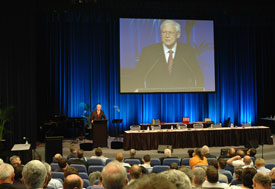Archbishop Jensen has delivered an emotional Presidential Address as the Synod prepares to make decisions on the reorganisation of the Diocese because of losses suffered during the world economic crisis.
Dr Jensen began by setting the scene of world uncertainty “What with Global Warming, the War on Terror and the Global Financial Crisis, we may well think that we live in apocalyptic times” he said.
But the Archbishop says Jesus makes it clear that “" the apocalyptic signs that he mentioned are always part of human experience. We are always in apocalyptic times.”
Then addressing the circumstances of the diocese, he said “How are we to read the history of this year in our Diocese? I would say just this. We live, as ever, with all the signs and some of the pain of an apocalyptic era, but our response is neither panic nor paralysis: it is persistent active faith.”

In a personal aside, Dr Jensen says ” I felt disbelief - I have been schooled to believe that this could not happen because we have been so careful and professional in our handling of the Endowment. I felt both let down and yet responsible since this has occurred on my watch and in part within funds in which I have a special interest. I felt doubt about whether we had engaged in ethically dubious practices by gearing the Endowment. I felt deep uncertainty about what we should now do and how we could carry on. Above all, I felt grief - and this I have continued to feel - as the impact of these losses on many fine ministries and on the jobs and personal lives of friends and colleagues has become clear.”
Dr Jensen said he didn’t believe the Glebe Board’s gearing strategy was ethically dubious “though I had to have an argument with myself to come to that conclusion”.
He went on to urge the Synod to pass the budget Ordinance, which provides for a revamped episcopal structure, no Archdeacons and moving emphasis away from the regional strategy to smaller ‘mission areas’.
Dr Jensen said he had not initially been attracted to the idea but now sees it’s ‘genius’.
“Local churches are often too weak to do new work alone; regions are too large for effective action” he said “My initial guess is that we will have about twenty Mission Areas, but as we consult locally that number may well grow.”
Dr Jensen said the pain of the financial losses was tempered by the Connect09 programme which he said had ” been a blessing on our cities and countryside. Personally, I have never had a better year for sharing God's word with others, one to one.”
He said the campaign had gripped lay people in particular.
He quoted in particular the case highlighted on the ABC’s Compass programme last Sunday of Northmead Anglican which had been praying for local businesses.
“I have heard of some amazingly inventive and effective ways in which churches have connected with the community his year.” he said.
Archbishop Jensen spoke with excitement about the church planting role he had asked Bishop Stewart to undertake and announced that Rev Bruce Hall of Carlingford had been asked to advise Bishop Stewart on cross-cultural work.
Dr Jensen also urged the diocese to continue its commitment to conservative theology and to a high view of scripture.
“Only this will carry Christianity forward in a culture such as Australia in the next fifty years.”
But he warned that theological conservatism should not be linked with cultural conservatism.
“There is a better path. We have signaled our allegiance to it already via the Diocesan Mission and especially Connect 09. It is who we are and who we want to be. It involves a commitment both to biblical theology and purity of doctrine, and also to our neighbours. We want to be citizens of our nation with a transcendent loyalty to the kingdom of God.”
As a result, Dr Jensen said, he wanted to deepen the partnership between Anglicare and the parishes and to establish a body to develop ‘distinctly Anglican’ education.























